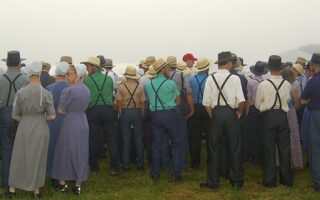Pentecostal denominations have varying beliefs and practices regarding female pastors. While some Pentecostal churches fully embrace and support female pastors, others hold more traditional views that restrict women from holding leadership positions within the church.
Table of Contents
The Role of Women in Pentecostal Leadership
Pentecostalism is a branch of Christianity that places a strong emphasis on the Holy Spirit and the gifts of the Spirit. It is known for its vibrant worship, speaking in tongues, and belief in the power of miracles. However, when it comes to the role of women in leadership, there has been some debate within the Pentecostal community.
Traditionally, Pentecostal churches have been known for their conservative views on gender roles. Many have interpreted certain biblical passages as suggesting that women should not hold positions of authority over men in the church. This has led to a general reluctance to allow women to serve as pastors or in other leadership roles.
However, in recent years, there has been a growing movement within Pentecostalism to challenge these traditional views and embrace a more egalitarian approach. This movement argues that the Bible does not actually prohibit women from serving in leadership positions and that women have been called by God to minister just as men have.
One of the key arguments made by those in favor of female pastors is that the Bible itself contains examples of women in leadership roles. For example, in the book of Acts, we read about the prophetess Anna, who served in the temple and proclaimed the coming of the Messiah. Additionally, the apostle Paul mentions several women who were leaders in the early church, such as Phoebe, who is referred to as a deaconess, and Junia, who is described as “outstanding among the apostles.”
Furthermore, proponents of female pastors argue that the Bible’s teachings on gender equality and the priesthood of all believers support the idea of women in leadership. They point to passages like Galatians 3:28, which states that “there is neither Jew nor Greek, slave nor free, male nor female, for you are all one in Christ Jesus.” This verse suggests that in Christ, all believers are equal and have equal access to God’s calling and gifting.
In response to these arguments, some Pentecostal denominations have begun to open their doors to female pastors. They have recognized the gifts and calling of women and have affirmed their right to serve in leadership positions. These churches have seen the positive impact that women pastors can have on their congregations, bringing fresh perspectives and insights to the pulpit.
However, it is important to note that not all Pentecostal churches have embraced this shift. There are still many who hold to the traditional view that women should not serve as pastors. This can be due to a variety of reasons, including a strict interpretation of certain biblical passages or a desire to maintain a sense of continuity with historical church practices.
In conclusion, the role of women in Pentecostal leadership is a topic of ongoing debate within the Pentecostal community. While some churches have embraced the idea of female pastors, others continue to hold to more traditional views. Ultimately, the decision of whether or not to allow female pastors rests with each individual church and its interpretation of scripture.
Examining the Scriptural Basis for Female Pastors in Pentecostalism

Do Pentecostals allow female pastors? This is a question that has been debated within the Pentecostal community for many years. While some denominations within Pentecostalism do allow women to serve as pastors, others do not. In this article, we will examine the scriptural basis for female pastors in Pentecostalism and explore the different perspectives on this issue.
One of the key passages that is often cited in discussions about female pastors is Galatians 3:28, which states, “There is neither Jew nor Greek, slave nor free, male nor female, for you are all one in Christ Jesus.” This verse is seen by many as affirming the equality of all believers, regardless of gender. Those who support female pastors argue that this verse should be applied to the role of women in leadership within the church.
Another passage that is often referenced is Acts 2:17-18, which says, “In the last days, God says, I will pour out my Spirit on all people. Your sons and daughters will prophesy, your young men will see visions, your old men will dream dreams. Even on my servants, both men and women, I will pour out my Spirit in those days, and they will prophesy.” This passage is seen as evidence that God’s Spirit can work through both men and women, empowering them to serve in leadership roles.
However, those who oppose female pastors argue that there are other passages in the Bible that suggest a different view. For example, 1 Timothy 2:12 states, “I do not permit a woman to teach or to assume authority over a man; she must be quiet.” This verse is often interpreted as a prohibition against women serving as pastors or in other leadership roles within the church.
In addition to these scriptural arguments, there are also cultural and traditional factors that influence the views of different Pentecostal denominations. Some denominations have a long history of male leadership and are resistant to change. Others have embraced the idea of female pastors and have seen the positive impact that women can have in leadership roles.
It is important to note that the issue of female pastors is not limited to Pentecostalism. Many other Christian denominations also grapple with this question and have come to different conclusions. Ultimately, each denomination and individual believer must prayerfully consider the scriptures and seek the guidance of the Holy Spirit in forming their own convictions on this issue.
In conclusion, the question of whether Pentecostals allow female pastors is a complex one. While some denominations within Pentecostalism do affirm the role of women in leadership, others do not. The scriptural basis for female pastors is a topic of ongoing debate, with different passages being interpreted in different ways. Ultimately, each believer must seek God’s guidance and form their own convictions on this issue.
Challenges and Opportunities for Female Pastors in Pentecostal Churches
Do Pentecostals allow female pastors? This is a question that has been debated within the Pentecostal community for many years. While some Pentecostal churches do allow women to serve as pastors, others adhere to a more traditional interpretation of scripture that restricts women from holding leadership positions within the church. In this article, we will explore the challenges and opportunities that female pastors face in Pentecostal churches.
One of the main challenges that female pastors in Pentecostal churches face is the resistance from those who believe that women should not hold leadership positions. These individuals often cite biblical passages that they believe support their position. However, there are also many Pentecostal churches that interpret these passages differently and believe that women are called by God to serve as pastors.
Despite the challenges, there are also many opportunities for female pastors in Pentecostal churches. As the role of women in society continues to evolve, more and more people are open to the idea of women serving in leadership positions within the church. This shift in attitudes has created space for female pastors to thrive and make a significant impact in their congregations.
One of the key factors that has contributed to the acceptance of female pastors in Pentecostal churches is the emphasis on spiritual gifts and the belief in the empowerment of the Holy Spirit. Pentecostals believe that the Holy Spirit equips individuals with gifts to serve the church, regardless of their gender. This belief has led many Pentecostal churches to recognize and affirm the calling of women to pastoral ministry.
Another opportunity for female pastors in Pentecostal churches is the growing number of women who are pursuing theological education. Many Pentecostal seminaries and Bible colleges now offer programs specifically designed for women who are called to ministry. These programs provide women with the necessary training and education to effectively serve as pastors in their churches.
In addition to theological education, mentorship and support from other female pastors and leaders within the Pentecostal community are crucial for the success of female pastors. Many women have found encouragement and guidance from those who have gone before them, paving the way for future generations of female pastors.
While there are certainly challenges and opportunities for female pastors in Pentecostal churches, it is important to remember that the ultimate decision lies with each individual church and its leadership. Some churches may still hold to traditional beliefs and practices, while others may be more open to the idea of female pastors. It is essential for women who feel called to pastoral ministry to prayerfully consider their options and seek God’s guidance in finding a church that aligns with their beliefs and values.
In conclusion, the question of whether Pentecostals allow female pastors is a complex one. While some Pentecostal churches do not allow women to serve as pastors, others embrace and affirm the calling of women to pastoral ministry. Female pastors in Pentecostal churches face challenges, but they also have opportunities to make a significant impact in their congregations. As attitudes continue to evolve and more women pursue theological education, the role of female pastors in Pentecostal churches will likely continue to grow and flourish.
Exploring the Global Perspectives on Female Pastors in Pentecostalism
Pentecostalism is a vibrant and diverse Christian movement that has gained popularity worldwide. With its emphasis on spiritual gifts and the power of the Holy Spirit, Pentecostal churches have attracted millions of followers. However, one question that often arises is whether Pentecostals allow female pastors. In this article, we will explore the global perspectives on female pastors in Pentecostalism.
It is important to note that Pentecostalism is not a monolithic movement, but rather a collection of diverse denominations and churches. As such, there is no one-size-fits-all answer to the question of female pastors. Different Pentecostal churches have different views on this issue, and these views can vary greatly depending on cultural, theological, and historical factors.
In some Pentecostal churches, women are fully embraced as pastors and leaders. These churches believe that both men and women are called by God to serve in ministry and that gender should not be a barrier. They point to biblical examples such as Deborah, who was a judge and prophetess in the Old Testament, and Phoebe, who was commended by the Apostle Paul in the New Testament. These churches argue that the gifts of the Holy Spirit are not limited by gender and that women should be allowed to exercise their spiritual gifts in leadership roles.
On the other hand, there are Pentecostal churches that hold a more traditional view on gender roles. These churches believe that the Bible teaches a hierarchical structure in which men are called to be the spiritual leaders of the church and women are called to be submissive and supportive. They often cite passages such as 1 Timothy 2:12, which states that women should not have authority over men in the church. These churches argue that allowing women to be pastors would go against biblical teachings and undermine the God-ordained order of authority.
The global perspectives on female pastors in Pentecostalism are as diverse as the movement itself. In some parts of the world, such as North America and Europe, there has been a growing acceptance of female pastors in Pentecostal churches. These churches have recognized the gifts and talents of women and have actively encouraged their participation in leadership roles. They have seen the positive impact that female pastors can have on their congregations and believe that it is important to reflect the equality and inclusivity of the gospel message.
In other parts of the world, however, the acceptance of female pastors in Pentecostal churches is still a contentious issue. Cultural and societal norms play a significant role in shaping these perspectives. In some conservative societies, the idea of women in leadership positions is still seen as unconventional and even threatening. As a result, female pastors may face significant challenges and resistance in these contexts.
In conclusion, the question of whether Pentecostals allow female pastors is a complex and multifaceted one. While some Pentecostal churches fully embrace and support female pastors, others hold more traditional views on gender roles. The global perspectives on this issue vary greatly depending on cultural, theological, and historical factors. As the Pentecostal movement continues to evolve and grow, it is likely that the question of female pastors will remain a topic of discussion and debate.
Conclusion
Yes, Pentecostals do allow female pastors.
For licensing reasons, we must provide the following notice: This content was created in part with the help of an AI.


